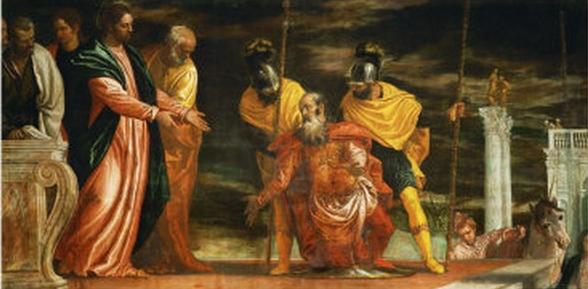Luke 7:1-10
Listen to sermon
Pastor Tom Johnson, May 29, 2016
The New Testament is often critical toward religious leaders of Jesus’ time. That is why I find it is so refreshing to hear about the elders of the synagogue in this community. The centurion is a gentile—of non-Jewish ancestry. He is not only a foreigner and outsider; he is part of the military occupation of Israel. I would love to know the story of how this soldier went into this foreign country and how he fell in love with her people and the Lord of all nations—the God of Israel. And why not be reminded this Memorial Day weekend of the many soldiers who have gone to distant lands to fight a war to then return years later as a missionary or simply to do good for they people they have grown to identify with and love? I grew up with veterans of World War II who came back with German and Japanese wives. I heard about a veteran last week who still goes back to Vietnam to help communities remove land mines. And, of course, there are many stories of soldiers who grew to love the people of Iraq and Afghanistan.
The elders serve as mediators between the centurion and Jesus. “He is worthy,” they say, “because he helped build the synagogue.” I’m sure there would be a lot of gratitude here at our place of worship if someone helped us pay for a new roof—outsider or not. “He is worthy for you, Jesus, to do some good toward him because he has done so much good toward God’s people.” They ask Jesus to heal the centurion’s slave—a servant that is also well loved by the centurion.
As Jesus heads toward the centurion’s home, the centurion himself says that it is unnecessary. He gives two reasons why Jesus should not continue on to his home. First of all, the centurion says he is not worthy—he is not worthy to have someone so esteemed like Jesus enter his home. Maybe it is because he fears that he cannot be hospitable enough. Or maybe he doesn’t believe he deserves such an honor. Or perhaps he has shame and guilt about who he is and what he has done as part of a foreign occupying force. Whatever it is, he says he is unworthy. It is that feeling that we are not good enough for the goodness of God or have done enough to earn the blessing. Perhaps we don’t feel we rank high enough in the social order or that our higher status in life should not lead to even more privilege. Or perhaps it is the truth that none of us meets God’s standards. “We all have sinned and fall short of the glory of God” (Rom 3:23). “All of us like like sheep have gone astray; each of us has turned to his own way” (Isa 53:6).
We know that we have failed to do what the law requires. But there is so much to commend to the people of our passage today. The elders and people of the synagogue showed love for the foreigner. The centurion loved his new neighbors as himself. The community sees the value of this newcomer even though he has the marks of the enemy. This soldier is open minded enough and tenderhearted enough to discover a deeper relationship with God with a new people he makes his own. Instead of finding shortcomings in each other—instead of pointing out each other’s flaws—instead of continuing to live in fear of one another, they become one family. The family of faith at the synagogue adopts a new son. The Roman Centurion chooses a new family and to support them with his gifts and treasure. And yet, only One is worthy and that is God alone. He alone is worthy and deserving of our praise. No one is good enough. No one has done enough good. No one has earned or deserved the blessings of God. Which leads us to the centurion's great insight into the economy of grace.
The second reason the centurion gives for not needing Jesus to come to his house to heal his slave comes out of his own experience. He is also one who is in authority and a person of great responsibility. “You don’t even need to come into my home, Jesus,” the centurion says, “you can just say the word and mountains will move, doors will open, and my servant will be healed.” In other words, God alone is worthy. And Jesus is his true prophet. The centurion understands that God’s thoughts are not our thoughts, his ways are not our ways. His work transcends human understanding. His healing, forgiveness, and love does not come because of our worth or worthiness. He heals, forgives, and loves us because of our unworthiness and our inability to help ourselves.
God is good enough. His only Son has done all that is right, good, and acceptable to us and our Heavenly Father. Jesus of Nazareth has paid the price for our healing by his sweat and his blood. Christ has earned our salvation by dying on the Cross of Calvary. The One who alone is worthy has risen from the dead. God brings us into community. He takes us who are outsiders and orphans and brings us into a family of faith. This is a nurturing community where we are not looking for fault in one another but finding worth and value in each and every member. We know that our truth worth does not come from ourselves but from the God of all glory and grace. He does not need to come under our roofs because he has already entered our hearts, minds, and lives.


No comments:
Post a Comment